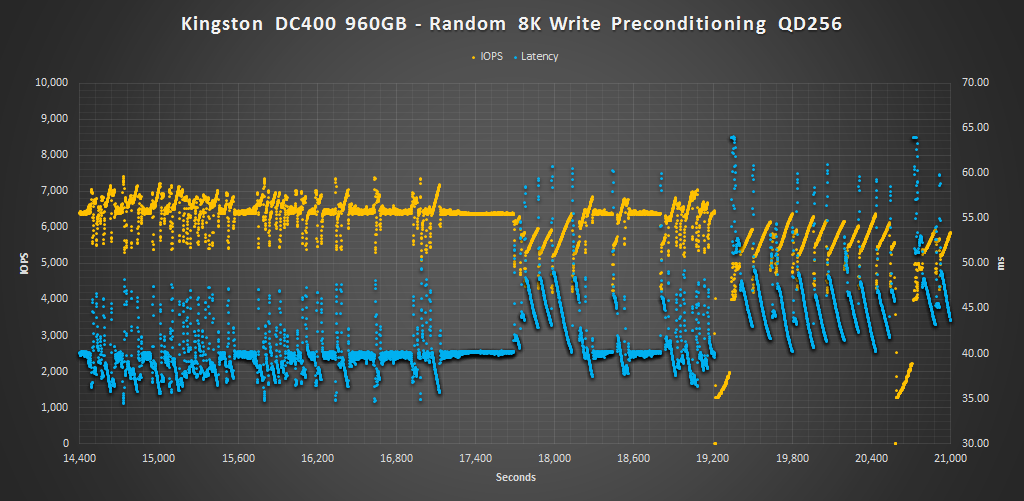8KB RANDOM READ/WRITE
To measure 8KB random read/write performance do the same preconditioning as we did for 4KB performance. The drive is first secure erased to get it in a clean state. Next, the drive is filled by sequentially writing to the RAW NAND capacity twice. We then precondition the drive with 8KB random writes at QD256 until the drive is in a steady state. Finally, we cycle through QD1-256 for 5 minutes each for writes and then reads. All this is scripted to run with no breaks in between. The last hour of preconditioning, the average IOPS, and average latency for each QD is graphed below.
The 8K write preconditioning results follow similar to that of the 4K results. Here we can see a performance distribution of about 2-3K IOPS on average with the 800GB model being much more consistent.
At 8K the results are very similar to what we have seen at 4K, but simply at a file size twice that of 4K and thus latency results are about double and IOPS are about half. The DC400 delivers nearly 40K IOPS read at both capacities, however, the over provisioned model delivers triple the write performance at 15K IOPS.
 The SSD Review The Worlds Dedicated SSD Education and Review Resource |
The SSD Review The Worlds Dedicated SSD Education and Review Resource | 


There’s that word “plethora” again.
Edited it out for ya since I seem to use it too much for your liking, haha.
I think it was our E-I-C that didn’t care for it, lol!
Otherwise, for me it would be “Pot, meet Kettle!”
How do you call MLC flash and sequential reads at 560, and writes at 525, entry level for
sata 3? And if you overprovision it to 800 it now beats out its competition in other categories besides sequential. This sounds like it’s a lot better than entry level for sata 3?
I’m referring to it as entry-level due to it’s total performance as well as endurance and price-point in product line-ups in the enterprise market. Compared to other read-oriented SATA SSDs the Kingston at the same capacity typically offers the least performance and lowest endurance in comparison to other similar classed <1 DWPD products and it doesn't have power caps on it in case of a power outage liek others do, simply firmware protection instead. Thus, in comparison, this why I am referring to it as an entry level product. Once you move onto 1-3DWPD SATA SSDs you are now dealing with better performing drives that last longer, thus, not entry-level. Yes, while over provisioned to 800GB it was able to match or beat some of the competition, but it is at the expense of usable capacity. If you were to over provision those other SSDs, you would see similar improvements in performance. At that point it is a whole new comparison of price vs performance vs capacity vs endurance…in which case, with all things being equal, the Kingston may be at the lower end of the totem pole once again.
I see said the blind man.